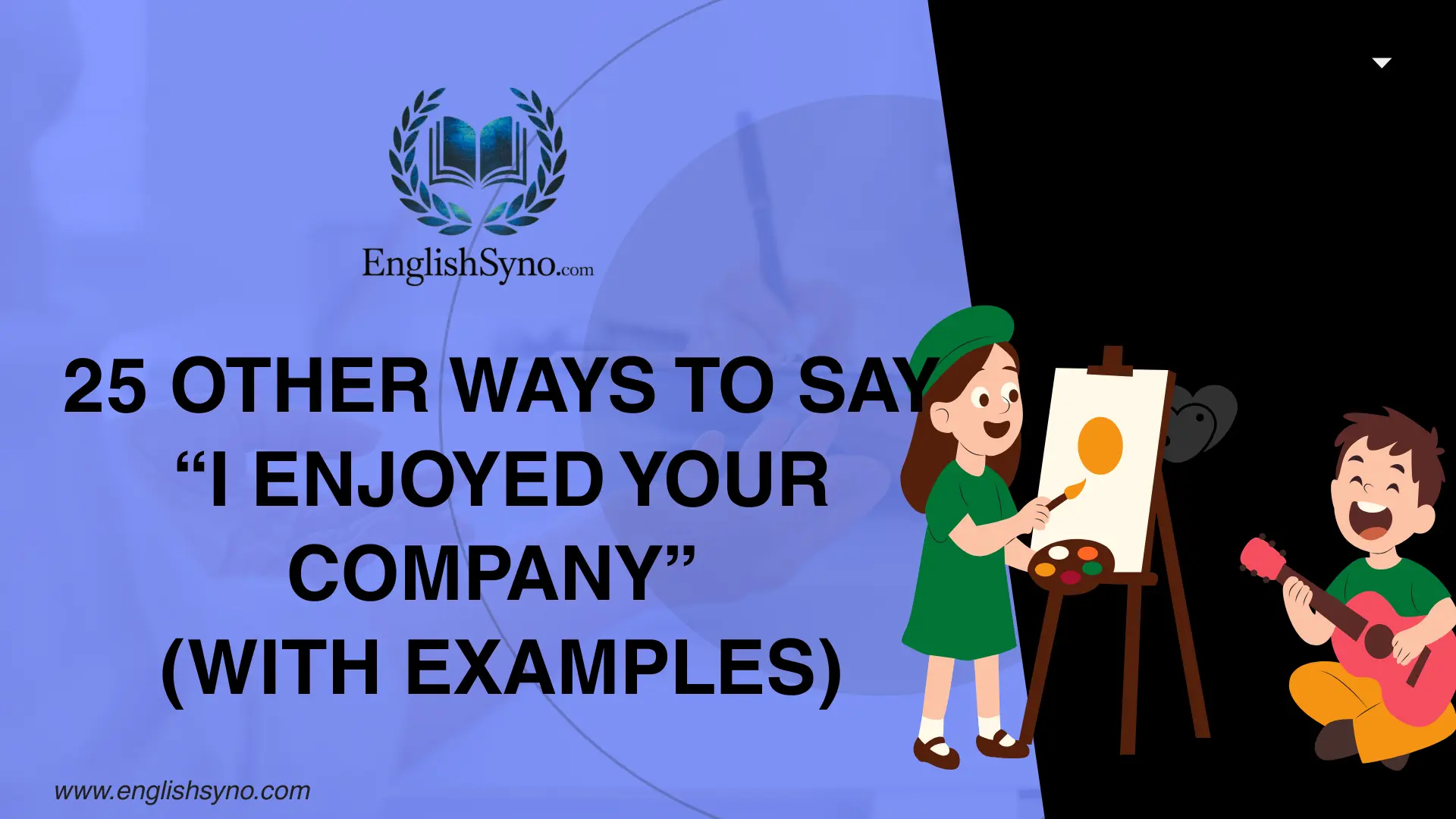I often think about the times I truly enjoyed someone’s company, and how a simple phrase can express deep feelings.
I always appreciated a friend’s presence, from quiet coffee to long evening chats, as these pleasant moments enhance relationships.
Thoughtful ways to connect, exploring expressions, deepening interactions, and cherished joy make every encounter memorable and lasting.
What Does “i enjoyed your company” Mean?
Meaning & Definition: Saying “i enjoyed your company” communicates that you found someone’s presence pleasant, meaningful, and enjoyable. It reflects gratitude, warmth, and companionship, and shows you value the time spent together.
Detailed Explanation: This phrase is used after shared experiences-casual or formal-to acknowledge someone’s impact on your mood or day. It implies friendliness, respect, and appreciation.
When to Use “i enjoyed your company”
Use this phrase after spending time with someone you genuinely appreciate, such as friends, colleagues in informal settings, or family. It works well in texts, emails, or verbal conversations to acknowledge the shared experience and foster connections.
Is It Professional/Polite to say “i enjoyed your company”?
Yes, it can be professional or polite when used in moderate, respectful settings, like team gatherings or after informal meetings with colleagues. Avoid overuse in highly formal communications.
Pros and Cons
Pros:
- Shows appreciation
- Strengthens relationships
- Makes interactions feel personal
Cons:
- Might feel too casual in strictly formal contexts
- It could be misinterpreted if the tone is unclear
I Truly Appreciated Your Company
Meaning & Definition: This phrase expresses deep gratitude for someone’s presence, emphasizing that their company had a meaningful impact.
Detailed Explanation: “I truly appreciated your company” adds emphasis with “truly”, making it clear that the interaction was sincerely valued.
Example: “I truly appreciated your company at the conference yesterday; your insights made the discussion much more engaging.”
Best Use: After one-on-one meetings, small group events, or casual gatherings.
Worst Use: Overly formal or strictly professional emails where “thank you” suffices.
Tone: Sincere, warm, appreciative.
I Had a Wonderful Time
Meaning & Definition: Indicates that you enjoyed the experience and valued the interaction, focusing on the overall experience rather than just presence.
Detailed Explanation: This phrase is great for highlighting the joy of the event or interaction, giving positive reinforcement to the host or companion.
Example: “I had a wonderful time at your dinner party; everything was delightful, and I really enjoyed our conversation.”
Best Use: Social gatherings, dinners, events, casual outings.
Worst Use: Formal business meetings where a simple “thank you” is expected.
Tone: Cheerful, warm, friendly.
I’m Grateful for Your Company
Meaning & Definition: Expresses gratitude and respect, emphasizing appreciation for the person being present and engaging.
Detailed Explanation: Highlights that you recognize their effort and time, making the interaction meaningful and thoughtful.
Example: “I’m grateful for your company during the project review-it made the process smoother and more enjoyable.”
Best Use: Work or social settings where recognition of presence and support is valued.
Worst Use: If the interaction was negative or neutral, it could feel forced.
Tone: Respectful, warm, appreciative.
I Cherished Our Time Together
Meaning & Definition: Expresses that you valued the shared moments deeply and they hold a special place in your memory.
Detailed Explanation: “I cherished our time together” conveys emotional warmth, showing that the moments spent were truly meaningful and enjoyable.
Example: “I cherished our time together at the park today; your stories and laughter made the afternoon unforgettable.”
Best Use: Close friends, family, or meaningful personal interactions.
Worst Use: Casual acquaintances or formal work meetings.
Tone: Warm, intimate, appreciative.
It Was a Joy to Be With You
Meaning & Definition: Highlights the pleasure and happiness derived from spending time with someone.
Detailed Explanation: This phrase conveys that the experience was emotionally uplifting, leaving a positive impression on both parties.
Example: “It was a joy to be with you at the art gallery; I left feeling inspired and happy.”
Best Use: Personal gatherings, celebrations, social events.
Worst Use: Professional or very formal settings where emotional expressions might feel out of place.
Tone: Cheerful, sincere, uplifting.
I Had a Blast
Meaning & Definition: A Casual way to express that you enjoyed yourself immensely during an event or activity.
Detailed Explanation: “I had a blast” is playful and energetic, showing enthusiasm and fun.
Example: “I had a blast at the concert last night! Thanks for coming along-it was unforgettable.”
Best Use: Informal gatherings, parties, or fun activities.
Worst Use: Formal meetings, professional settings, or sensitive occasions.
Tone: Casual, fun, lively.
It Was Such a Pleasure
Meaning & Definition: Conveys gratitude and delight, emphasizing that the interaction was pleasant and enjoyable.
Detailed Explanation: This phrase works for both personal and professional settings, expressing respect and friendliness.
Example: “It was such a pleasure meeting you for lunch; I really enjoyed our conversation and your insights.”
Best Use: Professional or personal encounters where politeness is important.
Worst Use: Situations needing a stronger emotional expression.
Tone: Polite, warm, appreciative.
I Found Our Time Enjoyable
Meaning & Definition: Highlights that the time spent was pleasant and satisfying, focusing on the experience rather than emotion.
Detailed Explanation: “I found our time enjoyable” is a neutral, appreciative way to acknowledge someone’s company.
Example: “I found our time enjoyable at the workshop; your contributions made it more engaging.”
Best Use: Professional or semi-formal settings.
Worst Use: Informal, close relationships where a warmer expression would feel better.
Tone: Neutral, polite, respectful.
I’m Thankful for Your Company
Meaning & Definition: Shows gratitude for someone’s presence and contribution to a positive experience.
Detailed Explanation: “I’m thankful for your company” conveys acknowledgment and appreciation without being overly casual.
Example: “I’m thankful for your company during the project brainstorming; your ideas were invaluable.”
Best Use: Professional or personal settings where you want to show gratitude.
Worst Use: Overly casual situations where a playful phrase would suit better.
Tone: Sincere, appreciative, polite.
I Appreciated Spending Time With You
Meaning & Definition: Expresses that you valued the moments shared and are grateful for the interaction.
Detailed Explanation: Highlights the importance of the experience, making the person feel acknowledged.
Example: “I appreciated spending time with you at the café; our conversation made my day.”
Best Use: Both personal and semi-professional encounters.
Worst Use: Extremely formal contexts where minimal phrasing is preferred.
Tone: Friendly, sincere, warm.
Your Company Was Delightful
Meaning & Definition: Emphasizes that being with someone was pleasurable and enjoyable.
Detailed Explanation: This phrase communicates enthusiasm and positive regard, leaving a good impression.
Example: “Your company was delightful at the seminar; I thoroughly enjoyed our discussion.”
Best Use: Social and professional interactions.
Worst Use: Situations requiring brevity or minimal emotional expression.
Tone: Cheerful, polite, warm.
I Relished Our Moments Together
Meaning & Definition: Conveys strong enjoyment and appreciation for shared experiences.
Detailed Explanation: “I relished our moments together” communicates personal satisfaction and fondness.
Example: “I relished our moments together on the hike; the scenery and conversation were perfect.”
Best Use: Close friends, family, and meaningful interactions.
Worst Use: Formal work emails or brief meetings.
Tone: Warm, appreciative, personal.
It Was Lovely Spending Time With You
Meaning & Definition: Expresses gentle warmth and appreciation for shared moments.
Detailed Explanation: A friendly, approachable phrase, suitable for various settings, conveying pleasantness and connection.
Example: “It was lovely spending time with you at the book club; I enjoyed our discussion immensely.”
Best Use: Social gatherings, friendly meetings.
Worst Use: Highly formal or corporate contexts.
Tone: Warm, polite, friendly.
I Treasured Our Time Together
Meaning & Definition: Highlights that the time shared was valuable and memorable.
Detailed Explanation: “I treasured our time together” emphasizes emotional significance, showing deep appreciation.
Example: “I treasured our time together at the art exhibit; your insights made it unforgettable.”
Best Use: Close friends, family, or intimate social settings.
Worst Use: Casual or brief encounters.
Tone: Heartfelt, sincere, appreciative.
I Enjoyed Every Moment With You
Meaning & Definition: Highlights that each part of the shared time was enjoyable.
Detailed Explanation: “I enjoyed every moment with you” communicates consistent pleasure and deep engagement.
Example: “I enjoyed every moment with you at the picnic; it was relaxing and fun.”
Best Use: Personal interactions or close social events.
Worst Use: Professional or brief meetings.
Tone: Warm, enthusiastic, personal.
Spending Time With You Was Refreshing
Meaning & Definition: Suggests that the interaction was uplifting and energizing.
Detailed Explanation: Indicates positive impact on mood, leaving the person feeling appreciated and valued.
Example: “Spending time with you was refreshing; our chat gave me new perspectives.”
Best Use: Personal or semi-formal settings where your company improved the experience.
Worst Use: Neutral or tense situations where emotional praise might feel awkward.
Tone: Cheerful, appreciative, uplifting.
I Felt Joyful Being With You
Meaning & Definition: Expresses happiness derived from the interaction.
Detailed Explanation: Focuses on emotional reaction, showing that the person’s presence had a positive effect.
Example: “I felt joyful being with you at the reunion; your energy made it memorable.”
Best Use: Personal gatherings, family, friends.
Worst Use: Corporate or highly formal contexts.
Tone: Warm, cheerful, personal.
Your Presence Brightened My Day
Meaning & Definition: Communicates that someone’s presence had a noticeable positive impact.
Detailed Explanation: Highlights gratitude and emotional upliftment, showing your appreciation explicitly.
Example: “Your presence brightened my day at the meeting; your ideas were inspiring.”
Best Use: Casual or professional settings where a positive effect is recognized.
Worst Use: Situations where humor or sarcasm might be misinterpreted.
Tone: Cheerful, warm, appreciative.
I Was Glad to Spend Time With You
Meaning & Definition: A Simple way to express satisfaction and pleasure from shared moments.
Detailed Explanation: Shows positive regard and acknowledgment without excessive emotional emphasis.
Example: “I was glad to spend time with you during the workshop; it was very insightful.”
Best Use: Social or professional contexts.
Worst Use: Situations needing stronger emotional expression.
Tone: Neutral, polite, friendly.
I Found Our Interaction Delightful
Meaning & Definition: Highlights that the interaction was enjoyable, pleasant, and meaningful.
Detailed Explanation: Focuses on the quality of interaction, suitable for both social and professional settings.
Example: “I found our interaction delightful at the networking event; your insights were valuable.”
Best Use: Semi-formal or professional interactions.
Worst Use: Very casual or playful situations.
Tone: Polite, professional, appreciative.
Being With You Was Truly Enjoyable
Meaning & Definition: Expresses genuine pleasure in someone’s company.
Detailed Explanation: Indicates that the experience was meaningful and positive, leaving a lasting impression.
Example: “Being with you was truly enjoyable during the team-building activity; it made the day fun.”
Best Use: Personal or professional settings with a warm rapport.
Worst Use: Highly formal communications.
Tone: Warm, sincere, friendly.
I Loved Spending Time With You
Meaning & Definition: Conveys strong enjoyment and emotional appreciation.
Detailed Explanation: A more intense expression of pleasure, showing deep connection and value.
Example: “I loved spending time with you at the concert; it was an unforgettable evening.”
Best Use: Close friends, family, and personal social settings.
Worst Use: Professional or formal environments.
Tone: Enthusiastic, warm, personal.
I Valued Our Time Together
Meaning & Definition: Highlights that the time shared was important and meaningful.
Detailed Explanation: Conveys respect and appreciation without being overly casual or emotional.
Example: “I valued our time together at the seminar; your feedback was insightful.”
Best Use: Professional and social settings.
Worst Use: Extremely casual or playful scenarios.
Tone: Respectful, warm, appreciative.
I Enjoyed the Moments We Shared
Meaning & Definition: Focuses on specific moments rather than the entire experience, emphasizing pleasant experiences.
Detailed Explanation: “I enjoyed the moments we shared” draws attention to the quality of interactions, making the person feel valued.
Example: “I enjoyed the moments we shared during lunch; your stories made it special.”
Best Use: Personal or semi-formal interactions.
Worst Use: Overly formal or brief meetings.
Tone: Warm, appreciative, friendly.
Our Time Together Was Memorable
Meaning & Definition: Communicates that the shared experience was significant, enjoyable, and worth remembering.
Detailed Explanation: Highlights the lasting impression and emotional value of the interaction.
Example: “Our time together was memorable at the retreat; I’ll always remember the laughter and insights.”
Best Use: Personal gatherings, meaningful events, social activities.
Worst Use: Professional settings needing neutrality.
Tone: Warm, sincere, reflective.
Final Thoughts
Expressing that you enjoyed someone’s company is more than a polite gesture-it reflects genuine appreciation, warmth, and thoughtfulness. Whether in personal friendships, family gatherings, or professional settings, choosing the right phrasing allows your message to feel personal and meaningful. From casual expressions like “I had a blast” to heartfelt ones like “I cherished our time together,” each alternative carries its own tone, nuance, and context.
Using these alternatives helps deepen connections, show gratitude, and leave a lasting impression. They make interactions memorable and convey that you value shared experiences. Furthermore, customizing your words to suit the relationship, setting, and emotional intensity ensures your expression resonates naturally. A well-chosen phrase can enhance relationships, encourage future meetings, and strengthen bonds.
Remember, the power of language lies not only in what you say but how you say it. By thoughtfully selecting words to express that you enjoyed someone’s company, you transform simple interactions into moments of genuine connection.
Whether casual, formal, or intimate, these 25 alternatives provide a toolkit for conveying gratitude, pleasure, and companionship, ensuring your sentiments are clear, heartfelt, and impactful. Take time to explore these options, adapt them to your style, and make your interactions truly memorable.
FAQs
What does “I enjoyed your company” mean?
It expresses that you found someone’s presence pleasant, meaningful, and enjoyable, showing gratitude, warmth, and companionship after shared time.
When should I say “I enjoyed your company”?
Use it after personal, social, or semi-professional interactions where you want to acknowledge and appreciate shared moments.
Is it professional to say “I enjoyed your company”?
Yes, in informal professional settings or team gatherings, it shows appreciation and warmth without being overly casual.
What are casual alternatives?
Phrases like “I had a blast” or “It was a joy to be with you” work for friends, social events, or casual outings.
Are there formal alternatives?
Yes, options like “I truly appreciated your company” or “It was such a pleasure” suit professional or formal meetings.
How can I make it sound more heartfelt?
Use words like “cherished,” “treasured,” or “delighted” to convey personal warmth and emotional connection.
Can it be used in texts or emails?
Absolutely. Short messages like “I enjoyed your company today” or “It was delightful being with you” are effective.
How do I avoid sounding repetitive?
Rotate among 25 alternatives, customizing them to the context, relationship, and tone for freshness.
Is tone important?
Yes, tone defines how your message is received-warm, sincere, casual, or formal, depending on the setting.
Can it enhance relationships?
Definitely. Thoughtful expressions show appreciation, strengthen friendships, family bonds, and professional rapport.
Should I always add an example of shared time?
Adding context like “during dinner” or “at the event” makes the phrase specific and memorable.
Can it be overused?
Yes. Using it too frequently may reduce sincerity, so vary expressions or choose alternatives.
How do I sound natural?
Combine genuine emotion, context, and word choice for authentic, heartfelt communication.
Are there cultural differences in use?
Yes, some cultures prefer formal or indirect expressions of enjoyment, so adapt accordingly.
How do I choose the best alternative?
Consider relationship type, event context, and emotional intensity, then pick an alternative that matches the sentiment and tone.

Muhammad Altaf is an English language specialist and professional content strategist with over 10 years of experience writing and teaching practical English usage, professional communication, and tone awareness. His work focuses on helping readers express ideas clearly, naturally, and confidently in real-world contexts.


